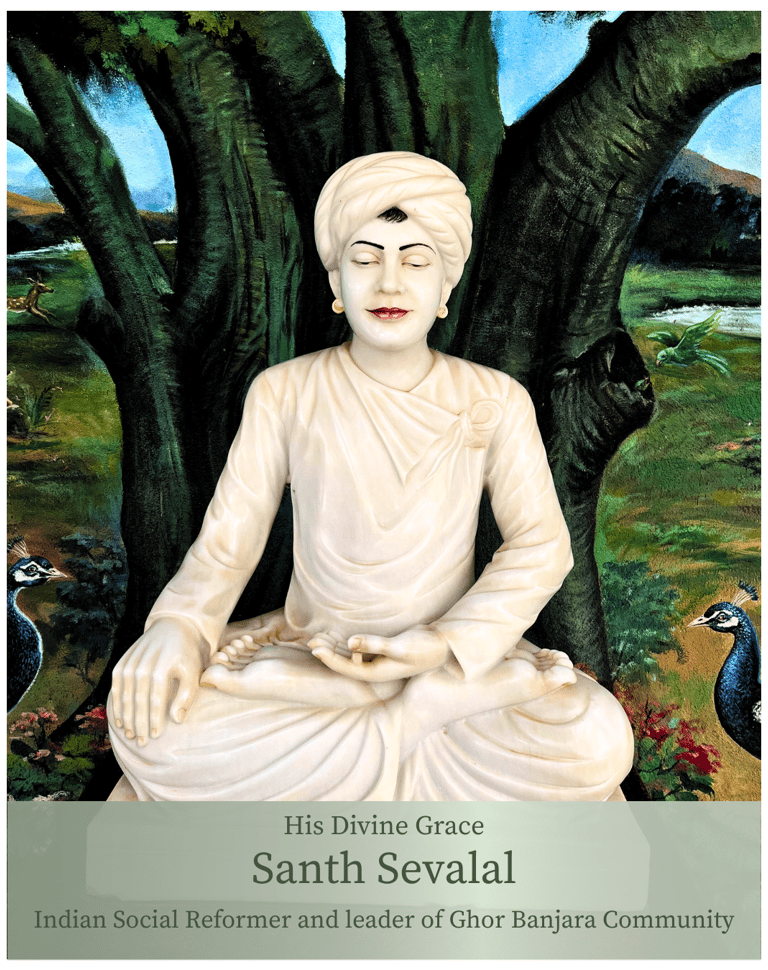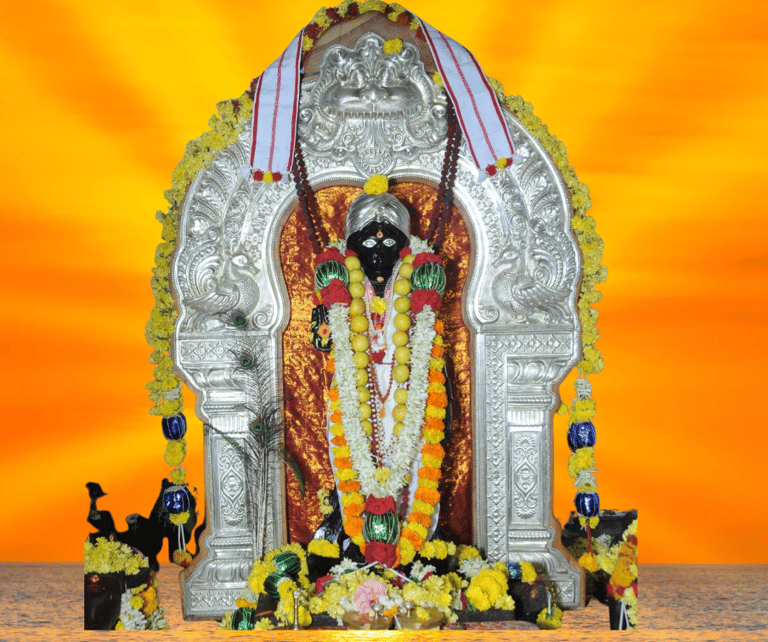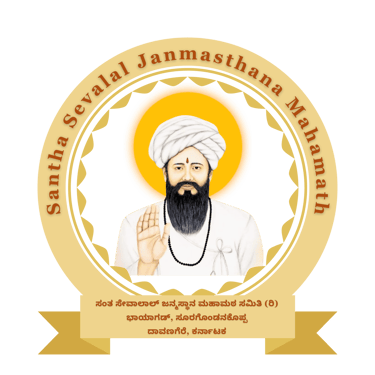A Brief History of Sevalal
Sant Sevalal Maharaj (1739–1806) is revered as the spiritual guide, divine protector, and social reformer of the Banjara community. He was born on February 15, 1739, in Bhayagad near Surgondanakoppa, Karnataka, to Shri Bheem Nayak and Smt. Dharminibai. His followers regard his birth as a divine blessing from Mata Jagadamba.
From an early age, Sevalal revealed extraordinary devotion, profound wisdom, and natural leadership qualities that would later shape the destiny of his community. Born into a family engaged in the traditional ladeni (cargo) trade of the Banjaras, young Sevalal grew up amidst a nomadic life of travel and toil. Yet, his heart was drawn not towards material gain, but towards meditation, worship, and selfless service. He nurtured deep devotion to the ancestral Goddess Mariyamma and to Lord Krishna, through which he attained divine vision and miraculous powers. But unlike others, he never used these powers for personal benefit; he dedicated them wholly to the welfare and upliftment of his people.
To the Banjaras, Sevalal was not merely a saint, but a beloved “Bhaya” (brother). Before the age of railways, when the Banjara caravans carried goods across the country with thousands of oxen and cattle, Sevalal accompanied them, guiding and protecting them throughout their journeys. He taught that honest work itself is a form of worship, and he tirelessly worked for the progress and unity of his community.
Sevalal’s greatness lay not only in his spiritual guidance but also in his social reforms. He shielded his people from external exploitation and at the same time urged them to rise above internal weaknesses.
He strongly advocated equality for women, cared for the sick, and laid down moral and social codes to uplift the quality of life. Known as a miracle worker, he provided relief during times of famine, drought, and hardship. His name continues to live in the folk songs, stories, and collective memory of the Banjaras even today.


During the late 18th century, when British oppression made life unbearable for the Banjaras, Sevalal provided new direction. In 1792, at Bahadur Banda near Koppal, on the occasion of Holi, he convened a great assembly of thousands of community leaders. On that historic day, he urged the Banjaras to gradually move away from the perilous ladeni trade and embrace agriculture, animal husbandry, and small-scale enterprises. He encouraged them to form organized tandas (settlements) and establish temples and monasteries under the sacred white flag, which forever became the emblem of peace and unity for his people.
Thus, Sant Sevalal came to be worshipped as the Kulaguru (ancestral spiritual guide) of the Banjaras. He was revered as a great yogi, sage, miracle-worker, and visionary who lived a life of perfect celibacy and complete selflessness. His mission was never for himself but always for the upliftment of his people.
In 1806, Sant Sevalal Maharaj attained Nirvana at Pohargad in Maharashtra, which today stands as a holy pilgrimage site.
His birthplace Bhayagad, too, has blossomed into a sacred spiritual centre. Every year, from February 13 to 15, lakhs of devotees from across India and abroad gather to celebrate his Jayanti Mahotsav. Devotees offer Mahabhog and observe the “Bhaya Vrata,” reaffirming his eternal message of unity, service, and devotion.
In his memory, the first temple dedicated to Sant Sevalal was constructed at Pohargad, Maharashtra in 1972. The second temple was built in 1977 at Bhayagad in Davanagere district of Karnataka, and the third temple was established in 2007 at Sevagad in Anantapur district of Andhra Pradesh. Today, even in remote villages inhabited by Banjaras, one can find temples and Matts dedicated to him.
Sant Sevalal Maharaj is remembered not only as a yogi and philosopher but also as a healer, reformer, and protector of his people.
His life instilled in the Banjara community the values of truth, discipline, service, and unity. His divine legacy continues to shine as an eternal ideal, not only for the Banjaras but for the entire human society.
Sant Sevalal Maharaj – Spiritual Guide of the Banjara Community
Goddess Mariyamma is one of the most revered deities of the Banjara community and is worshipped as the Goddess of health, protection, and prosperity. She is believed to safeguard her devotees from diseases, hardships, and evil forces, blessing them with strength and wellbeing.
For generations, Banjaras have celebrated Mariyamma with deep devotion through annual jatras (festivals), rituals, and traditional songs and dances that reflect their unique culture. Her worship is not only a spiritual practice but also a symbol of unity and identity for the Banjara people.
History of Mata Mariyamma


A Story of Bhayagad
History of Bhayagad Video Series







